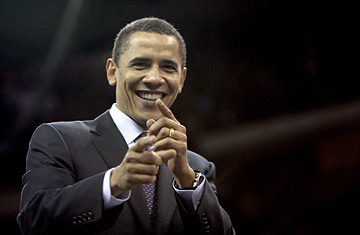
Democratic presidential candidate Senator Barack Obama addresses the crowd gathered at the Kohl Center on the University of Wisconsin-Madison campus, on Tuesday, February 12, 2008.
The old head-scratcher — what happens if an irresistible force meets an immovable object? — now gets its test in the Democratic presidential primary.
The force is Barack Obama. His sweep of the Potomac Primaries in Virginia, Maryland and Washington, D.C., on Tuesday gives him seven straight wins since Super Tuesday, not to mention his first lead in pledged delegates. Unprecedented amounts of money are pouring into his campaign coffers. He now has momentum that any challenger would envy in any year. Indeed, in any other year, a candidate with his numbers would have the nomination locked up tight.
But standing in his way is the adamantine Hillary Clinton, whose organization, decades in the making, is deeply rooted from coast to coast. She's as easy to knock over as the Great Wall.
"This year is something different," says Patrick Kenney, chairman of the political science department at Arizona State University, and an expert on the subject of political momentum — what it is and how it works. "Twice before, Obama appeared to have the momentum in a traditional sense, coming out of Iowa and coming out of South Carolina. In both cases he ran into an incredibly experienced and well-financed campaign led by a candidate with high name-recognition and great resilience."
Each time, the political ground shook from the impact of Obama's campaign crashing into Clinton's. In trying to decide who suffered more damage, it all came down to point of view. Was it more significant that Clinton edged out Obama in New Hampshire, or that Obama dusted himself off and kept coming? How could Clinton possibly lose the nomination after landslide victories in California and New York, the twin pillars of any Democratic electoral college strategy? And how could Obama possibly lose the nomination while winning more caucuses, more primaries, more votes and more pledged delegates?
After Tuesday night's results, many observers will be tempted to declare that his current momentum is different, and that Obama is now truly unstoppable. In Virginia, Obama won around 64% of the vote, doing especially well not just with his expected bases of independents, young voters and African-Americans, but also besting Clinton at the segments touted as her strengths — older and blue-collar voters, and even women. His performance in Maryland, where he took around 60% of the vote, was equally impressive and broad-based.
Both Clinton and Obama have run textbook versions of victorious campaigns — one deftly executing the Establishment Juggernaut strategy, the other ably pulling off the Insurgent Newcomer strategy. Some years, the nominee is the one who fails the least, but not this year. Hillary Clinton has piled up more votes and more money than any previous Democrat in a contested primary. And Obama has still more of both.
Momentum is most powerful, according to political scientists, when the field is fairly evenly matched. Imagine a group of a half-dozen or so candidates, each with a mix of strengths and weaknesses — the 2004 Democratic field, for example. Most of the country knows relatively little about any of them until the first contests. If one candidate appears to be surging in Iowa and New Hampshire, that success becomes a settled and powerful reality in the minds of voters in later states. Success breeds more success. That's how John Kerry did it.
When there is a strong front-runner, momentum is less decisive. Gary Hart discovered this in 1984. He surged out of Iowa and New Hampshire only to break his spear on the front-running campaign of Walter Mondale.
Though Obama is far stronger than Hart ever was, he remains wary of putting his faith in the power of momentum. "We certainly don't factor momentum into any of our calculations," said David Plouffe, Obama's campaign manager, on Tuesday afternoon. "We obviously did well on Saturday and Sunday but we don't think that has much relevance to what happens in the Mid-Atlantic. And whatever happens [in Virginia, Maryland and the District of Columbia] is not going to have much impact in Wisconsin or Hawaii [next Tuesday]."
Clinton spokesman Howard Wolfson agreed, telling the New York Times that "there is no evidence that voters are voting based on momentum."
But Professor Kenney points out that ordinary voters aren't the only ones who might be swept up by Obama fever. There are also the nearly 800 super-delegates to the Democratic convention — party officials and elected leaders who are free to vote as they choose. "I think as the momentum begins to shift again to Obama, it might have a real impact on those super-delegates. The trends appear to point to a good year for the Democrats — the war still troubles people, the economy is down, President Bush's poll numbers are low. The one thing Democratic leaders won't want is a messy convention."
Of course, any wavering super-delegates are destined to run into the powerful persuasive skills of Hillary and Bill Clinton, which leaves us once again with the eternal head-scratcher — the wave against the rock.
Turns out Einstein's physics provide the answer to that old paradox. A truly irresistible force colliding with a genuinely immovable object will produce an enormous black hole — which is, come to think of it, precisely what some nervous Democrats are starting to worry about.
